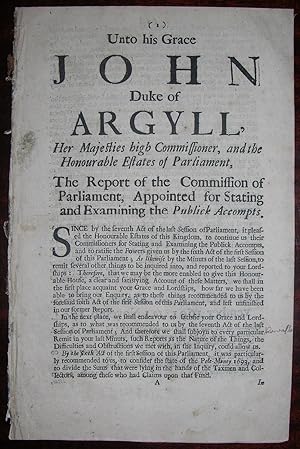Descripción
CAMPBELL, John, second duke of Argyll and duke of Greenwich (1680 1743). Unto his Grace John Duke of Argyll, Her Majesties high Commissioner, and the Honourable Estates of Parliament, the Report of the Commission of Parliament, Appointed for Stating and Examining the Publick Accompts. [Edinburgh: 1704/1705]. Folio (11 4/8 x 7 4/8 inches). 15-pages, disbound (old folds). Provenance: with the engraved armorial bookplate of James, Earl of Bute (1666 1710), member of the last independent Scottish parliament and appointed one of the commissioners to negotiate the union of Scotland with England in 1702, on the last page The Scottish parliament presents its accounts to Queen Anne's newly appointed High Commissioner, John Campbell, duke of Argyll. Campbell was very young, at 23, when but he was recalled to London and Scotland by his father's death on 25 September 1703. "His father's friend the king had already died, and had been succeeded by his sister-in-law Anne in March 1702; but the new second duke of Argyll was given command of his father's regiment of Scots horse guards and sworn of the privy council, in succession to his father. Six months later he was invested with the Order of the Thistle. There was some delay in making him an extraordinary lord of session, due to his youth and lack of legal training, but these objections were overcome by the time that the new duke found himself called upon, at the age of twenty-five, to take a leading role in determining the future of his ancestral nation. The Scottish parliament elected on the accession of Anne refused to follow the lead of the English parliament in determining the succession to the throne of Scotland, using the issue as a means of drawing attention to problems of government in Scotland, which had grown worse during William's reign. In desperation the English court turned to Argyll, who demanded a high price: promotion to general and an English peerage. He got the first before meeting the Scots parliament in 1705; the second would become his eventual reward. Argyll distrusted the older Scots court politicians, such as the duke of Queensberry, but really he distrusted all politicians and, having inherited his father's place as head of one of the largest aristocratic interests in Scotland, he behaved almost as a monarch in his own right, threatening to resign as lord high commissioner if his recommendations were not accepted. It was a defining moment in his life (Alexander Murdoch for DNB). ESTC T194983. Catalogued by Kate Hunter. N° de ref. del artículo 72lib1307
Contactar al vendedor
Denunciar este artículo
![]()
